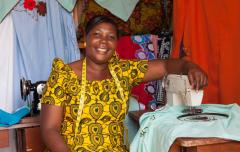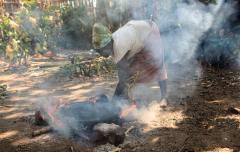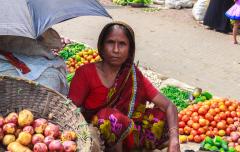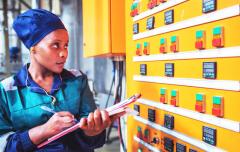Energy safety nets can help promote gender equality
By Caroline McGregor, Lead Specialist for Energy Access and Gender Sustainable Energy for All
The 63rd Commission on the Status of Women, which was held at the UN Headquarters between March 11 and 22, is closely linked to the work of our People-Centered Accelerator in promoting gender equality in energy access.
Thousands of advocates, civil society leaders, and government representatives gathered at this year’s conference to review progress on our global effort to empower women in sustainable development. The gathering was held under the theme, ‘Social protection systems, access to public infrastructure for gender equality and the empowerment of women and girls’.
The People-Centered Accelerator, a coalition of almost 50 partner organizations, strives to put women, the poor, and marginalized groups at the forefront of our commitments to Sustainable Development Goal 7. Addressing gender inequality will be essential to achieving a just and equitable transition to a sustainable energy system. Women and girls too often bear the greatest impact of unreliable and expensive energy sources.
“Women’s empowerment and gender equality are essential to global progress,” said UN Secretary-General António Guterres on International Women’s Day on March 8.
That statement reflects our belief that by working together, we can create a system that closes gender gaps. The inclusion of women and the poorest people in society is a vital part of efforts to achieve access to sustainable energy services. Related business opportunities can help secure a just energy transition that leaves no one behind.
Findings to date clearly highlight the need to think differently about how energy is delivered to women as well as the rural poor, disabled people, and displaced families. If we are serious about reaching universal access by 2030, we have to place these communities at the top of our agenda and prioritize those who will be left behind.
To support this, the Accelerator held a roundtable with partners during this year’s Commission on the Status of Women - hosted by the United Kingdom’s Permanent Mission to the UN - to discuss emerging research on energy safety nets.
Energy safety nets are social assistance programs designed to enable access to, and the use of, modern energy services. This new research, commissioned by Sustainable Energy for All (SEforALL), aims to bring data and evidence to the conversation around social safety nets and build the base of international experience to advance progress on delivering energy to last-mile communities.
The project’s two leading research organizations (and Accelerator members), Overseas Development Institute (ODI) and the Catholic Agency for Overseas Development , presented the framework to develop case studies on how energy safety net program are evolving in six countries, including Mexico, Brazil, Ghana, Kenya, India, and Indonesia.
By working with local researchers, the project seeks to understand how energy safety nets programs were initially designed and how the parameters governing who’s eligible for the assistance have been modified and improved over time.
Safety net programs include cash and in-kind transfers targeted to poor and vulnerable households. Their goal is to protect families from the impact of economic shocks, natural disasters, and other crises. Energy safety nets can take a broad variety of forms, from general energy subsidies to highly targeted measures for specific social groups.
The research includes a review of energy provisions within the social protection sector, and investigating the availability and impact of support for access to modern energy services for the very poor and vulnerable. The six case studies and synthesized findings are expected within six months.
As the SDG7 Tracking report consistently shows, we are not on track to meet the 2030 goals and deliver truly universal energy access via modern energy services. We will only achieve universal energy access if we intentionally include women and socially marginalized groups in the design of policies and programs. That means seeking to engage and empower communities in every aspect of our delivery approaches.
Moving forward, the Accelerator and its partners will seek opportunities to support implementation of these inclusive approaches in energy development planning.
Find out more about the People-Centered Accelerator network here and follow #SDG7AllEqual online.
Photo credit: UN Women/Ryan Brown




